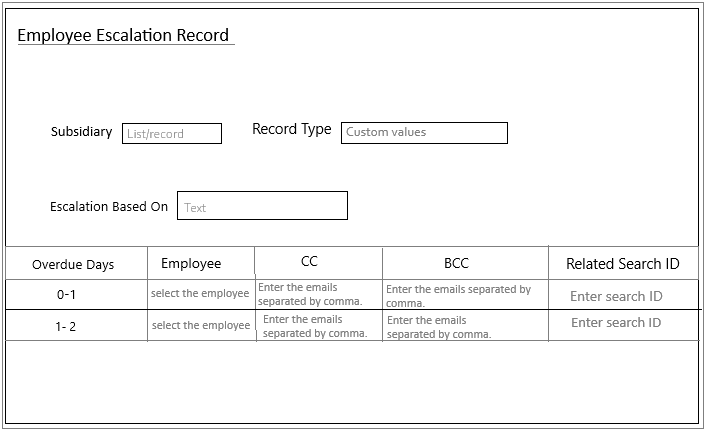Proposal Summary
This proposal covers the scope for developing and implementing an escalation module to send automated escalation emails to employees when designated actions are not completed by the assigned individual due to their unavailability.
The estimated time to complete the work detailed in this proposal is 24 hours.
This proposal is based on our discussions, anticipations, and understanding derived from our meetings and other communications. Any additional requirements or updates that arise during the development process will be handled as change requests.
Requirement
The client has requested an escalation module to alert the employee through email regarding the actions to be taken for records in the absence of designated employee.
Deliverables
The implementer has reviewed the requirement thoroughly and proposes the following deliverables:
- Designing “Employee Escalation Record” (Custom Record) for escalation module: The implementer will create a custom record with the following fields.
- Subsidiary
- Record Type
- Escalation Based On (for e.g., based on status or inactivity)
- In the sublist of the record, the following fields will be available:
- Overdue days: This represents the threshold for how long the records are overdue.
- Employee: The email to be sent
- CC: The emails to be added as CC. It is separated by commas.
- BCC: The emails to be added as CC. It is separated by commas.
- Related Search ID: This field will specify the search ID of the search provided by the client. The search results will include records that meet the overdue days threshold.
A demo of the custom record is provided below.

- Scheduled script for Escalation email sending:
- A scheduled script will be developed and deployed for each record type by the implementor, with parameters such as the record type and email author dynamically configurable.
- The script will retrieve escalation details, such as overdue days, employee, CC, BCC, and search ID, from the custom record “Employee Escalation Record.”
- Custom records will be grouped by Subsidiary and Escalation Basis to ensure proper organization.
- Emails will be sent based on the escalation details configured in the “Employee Escalation Record.”
- Email sending:
- For each overdue days, emails will be sent to the employee associated with the corresponding overdue limit specified in the custom record “Employee Escalation Record”, along with the CC and BCC recipients listed in the same record. The email will have details of the records as a csv file.
Notes:
- The script will support a maximum of 10 recipients in total, including the primary recipient, CC, and BCC addresses.
- A static subject line and email body will be used, with the only variation being the overdue days mentioned in the content.
Assumptions
- The implementer assumes that for each subsidiary and record type, separate custom records will be created.
- The total number of email recipients, including the primary recipient, CC, and BCC, must not exceed 10.
- If escalation emails for a subsidiary and a record type vary based on specific criteria (e.g., status changes or the record becoming inactive), a separate Employee Escalation Record must be created with the relevant Escalation Based On field specified.
- It is assumed that the script will not be scheduled to run multiple times within the same day.
Risks
If the total number of email recipients exceeds 10, including the primary recipient, CC, and BCC, the script will not execute successfully.
Notes
- The searches specific for a subsidiary, record type and based overdue days is to be provided by the client.
- For example, consider a custom record with the subsidiary set as A and the record type as Sales Order. The sublist contains two lines: one for overdue records of 0-1 days and another for 1-2 days. For the 0-1 days line, a search should be created to fetch results matching the 0-1 days overdue criteria. Similarly, for the 1-2 days line, a corresponding search should fetch records meeting the 1-2 days overdue condition. For all custom records, searches should be created by the client based on the specified criteria to ensure accurate results for each overdue range.
- The existing email-sending process triggered when a record is created or on approval will remain unaffected.
Estimated Effort
Estimated Effort – 24 Man Hours
Estimate assumptions
The estimate includes Project management, risk analysis, system analysis, fields creation, development, unit testing, regression testing, documentation, and deployment.